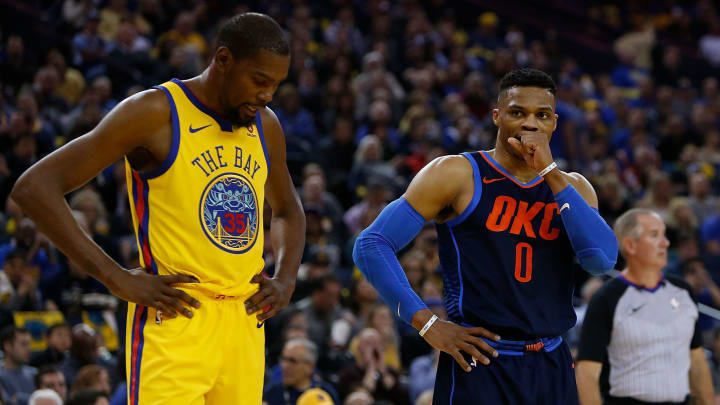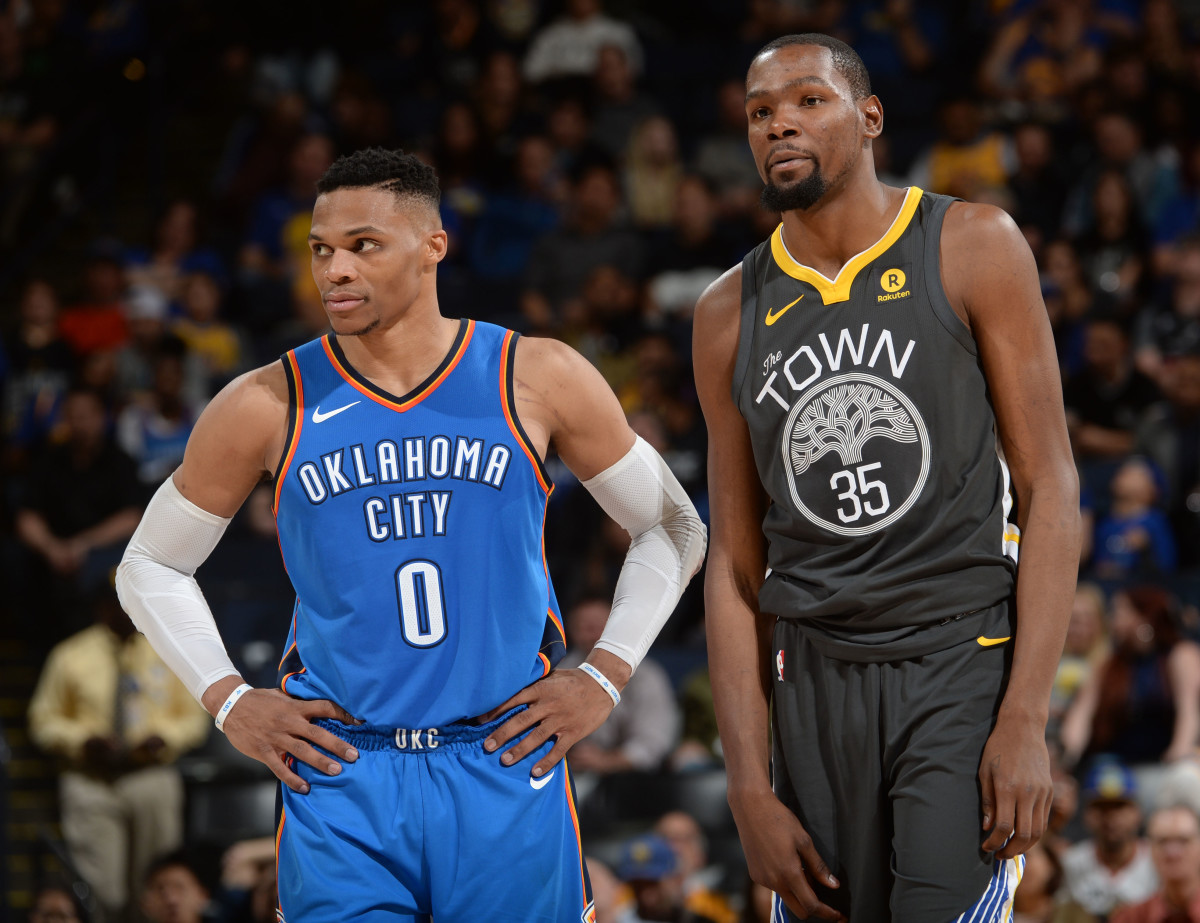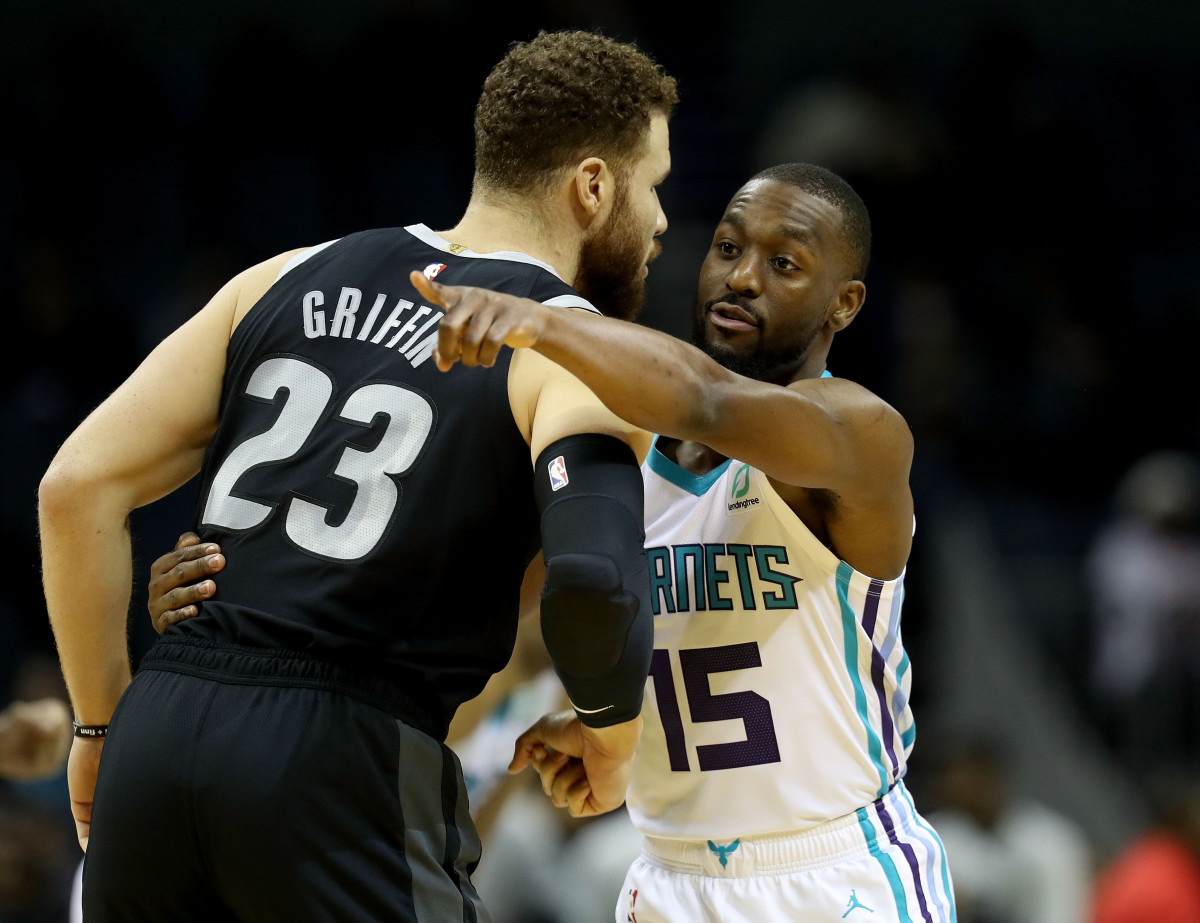2019 NBA All-Stars: Kevin Durant, Russell Westbrook Top SI's Crowded Field of Reserves

Last week, I announced my selections for the starters of the NBA All-Star Game. Today, we complete the exercise by naming the reserves.
Seeing as the NBA’s official All-Star starters won’t be announced until Thursday night, I’ll be choosing reserves based on my own official ballot for the starting lineups. My starters for the Western Conference are: Stephen Curry (Warriors), James Harden (Rockets), LeBron James (Lakers), Paul George (Thunder), and Anthony Davis (Pelicans). For the East, I chose: Kyrie Irving (Celtics), Ben Simmons (76ers), Giannis Antetokounmpo (Bucks), Kawhi Leonard (Raptors), and Joel Embiid (76ers). You can read more on why those players were selected in our initial post.
Those starters had to be selected according to positional designation (with two guards and three frontcourt players in each conference), but the reserves aren’t bound by those same rules. This is how I would make sense of a crowded field to complete the All-Star rosters for both conferences:

WESTERN CONFERENCE
Kevin Durant (Warriors) and Nikola Jokić (Nuggets)
Both are undeniable inclusions with unimpeachable credentials. Both Durant and Jokić will be in the mix for MVP and All-NBA voting this season, yet in the West they’re stuck clawing for a starting spot alongside James, Davis, and George. Choose between those five however you will, but all will end up in Charlotte one way or another. Remember that starting is a somewhat perfunctory honor. What matters—in matters of legacy, repute, and even contract bonuses—is whether a player was named an All-Star at all. Durant and Jokić will be there.
Damian Lillard (Trail Blazers), Karl-Anthony Towns (Timberwolves) and Rudy Gobert (Jazz)
Were Curry and Harden playing at anything resembling mortal levels, Lillard might have a case as a potential starter. Instead, he’s the definitive next guard up—a savvy practitioner of the pick and roll who understands how to keep an offense afloat. At this point, Lillard knows every nook and cranny; every year he gets even sharper when it comes to reading the defense and picking his spots, and this season he’s been in particularly rare form. There just aren’t many guards operating at Lillard’s level these days, and it shows in the way he’s carried Portland to a 29–20 record despite a relative down year from C.J. McCollum and so-so performance from most of the supporting cast, Jusuf Nurkić excluded.
If Portland can count on any one thing, it’s that Lillard will be a problem on every trip down the floor. Defenders flock well above the three-point line for fear of his deep three-point shooting, and in doing so distort the entire structure of their defense. Curry and Harden aren’t the only shooters capable of weaponizing the NBA’s changing geometry. Lillard is right behind them, tugging at his opponent’s defensive principles until they snap.
MAHONEY: All-Star Starters: LeBron, Giannis Lead the List
As for Towns, don’t let the loud, newsy exits of a star teammate and a head coach distract from what has been the best basketball of his career. This is the closest Towns has come to truly, honestly giving a damn on defense, and it shows. Minnesota’s improvement on that end isn’t solely attributable the gradual creep of a growing core or the arrival of an all-league defender in Robert Covington. Towns is legitimately, noticeably better in coverage—locked in from action to action in a way he’s never been. Kevin Garnett he is not, but when a player already boasts the most robust skill set of any big man in the league, even respectable defense goes an awfully long way. So few can do what Towns can do easily. There are times where you wish he would punish his defender in the post or really let it fly from three, but the fact that both solutions are prescribed for the same center speaks to his unique talents.
Gobert is another easy call made easier by Utah’s gradual rebound. A merciless Jazz schedule has finally relented, and nearly every player involved looks better for it. With the dust settled, Gobert is in position to make a second-half push for Defensive Player of the Year. Some franchises have better team defenses by the numbers, but other candidates—George and Steven Adams included—have held opponents to fewer points per possession in their time on the floor. Every rule change and stylistic shift in the NBA seems to work against defensive centers, and yet Gobert is still finding ways to change the game on a nightly basis. Leave him unattended for even a moment and Gobert, who has more dunks this season than any non-Greek Freak, will convert easily. Forget to box him out and every rebound becomes forfeit. Gobert doesn’t want to waste anyone’s time with token post-ups or dribble hand-offs for the sake of feeling involved. Let the guards have their fun, so long as they bust back on defense and do their jobs. Anything less, and Gobert will let them hear it.
Jrue Holiday (Pelicans) and Russell Westbrook (Thunder)
This is where the selection process becomes riddled with finer lines. Luka Dončić is a star by any measure, albeit one who still defends like a rookie, plays a bit fast and loose with the ball, and is feeling his way through the nuances of actually running an NBA offense. LaMarcus Aldridge and DeMar DeRozan are steady hands for a Spurs team that wins on depth. The Clippers are enough of an ensemble to complicate the candidacy ot Tobias Harris and Danilo Gallinari, neither of whom has been put through quite the same strategic rigor as your typical star. There’s so much to love about the game of De’Aaron Fox. It’s not really an insult to say that he might not yet be on the level of the best guards—and, considering these lax positional guidelines, the best players—in the conference. This wasn’t quite the year for Klay Thompson, whose definitive strength was offset by uncharacteristic percentages. Mike Conley was, is, and seemingly will forever be on the cusp.
After weighing the credentials of those candidates (and more), I opted for Holiday and Westbrook. I suspect some going through this exercise will have their gag reflex tripped by the thought of two All-Stars coming from the 22–26 Pelicans. Yet the discussion of whether a certain team “deserves” multiple All-Stars based on record alone seems borne of a willful ignorance. New Orleans hasn’t underwhelmed because of Holiday. Their season is a cautionary tale of what can happen when an already flimsy roster is compromised by injury. The Pelicans have their stars, but little else; most of the big-picture metrics and indicators are bound to underwhelm when a team employs just four good players, three of whom are bigs.
SHARP: Let Us Step Back and Appreciate James Harden
I don’t see the value in penalizing Holiday for what happens when he’s not on the floor. When he is, New Orleans has been about as effective as Denver has been with Jokić in the lineup. Most every indicator available points to Holiday as a star burdened by dead weight. You can find players who score or assist a bit more, but none who defend as well or exert quite as much influence on the game.
A player like Westbrook would have to do an awful lot to overcome his troubling inefficiency. Fortunately for the Thunder, he does. Westbrook has struck what might be the healthiest balance of his basketball career, carrying his usual creative load while also allowing George greater ownership of the offense. Their pairing has never looked better, even as Westbrook’s shooting percentages have largely tanked. No matter the numbers, defenses still have to regard Westbrook as the propulsive threat he is. You can give him the three. Everything else seems to roll downhill, where a full-speed Westbrook stress tests the defense for positioning and timing. That momentum carries the second-highest assist percentage in the league and leads to increasingly sophisticated setups. The caricature of Westbrook is a runaway train, and at times he lives up to it. More often, though, he plays against type by modulating his speed and angle to create a new edge. Even aggressive players can make cerebral reads, and Westbrook never seems to get enough credit for being one step ahead.
There’s no hiding from just how poor Westbrook’s shooting has been. The Thunder unquestionably need him to take fewer threes (and, for that matter, better ones), scaling back on the quickfire pull-ups that play right into the defender’s hands. At the same time, Oklahoma City scores at a top-five rate whenever Westbrook is on the floor and falls to pieces without him. An engine that doesn’t run to its cleanest, most efficient potential is still an engine, fully capable of getting you wherever you need to go. You just have to learn to live with some of the waste.

EASTERN CONFERENCE
Bradley Beal (Wizards), Kemba Walker (Hornets) and Blake Griffin (Pistons)
Concocting an Eastern Conference All-Star team without Beal, Walker, and Griffin would be an act of extraordinary imagination. Beal might well be the best guard in the East this season, mired though he is by circumstance. The Wizards are the worst they’ve been in years but this may be the best Beal has ever played. The list of players averaging 25 points, five rebounds, and five assists this season reads an awful lot like a listing of the NBA’s best players, featuring LeBron James, Stephen Curry, Kevin Durant, James Harden, and Giannis Antetokounmpo. Beal and Griffin both are in line for those benchmarks as they drag lifeless teams toward the playoffs. Walker’s season strikes much the same tone; a six-foot guard can only do so much to carry a team, but damn if Kemba doesn’t do every bit of it. To squeeze a net-positive differential out of Charlotte’s roster is a staggering achievement. How many other players could make something of a roster where the next-best players are Jeremy Lamb, an injured Cody Zeller, and a washed-up Nicolas Batum?
Nikola Vučević (Magic) and Victor Oladipo (Pacers)
For years, something about Vučević’s play rang hollow. Double-doubles are nice, but they aren’t in themselves indicators of quality—only of a particular kind of stat-keeping that can be deceptive in losing situations. That losing hasn’t changed in Orlando, though the tide behind Vučević has; there’s only so much one can do to explain away the contributions of a big who can shoot, pass, post, and rebound so consistently. The Magic remains a mess, but Vučević is one of very few players involved capable of making any sense at all of his surroundings. The closest that Orlando ever comes to competence is when Vučević is at the center of the operation— creating, distributing, and providing some semblance of structure, bringing one of the six worst teams in the league by net rating to break even in his minutes.
WOO: Oladipo Injury Leaves Pacers at Jarring Crossroads
Oladipo deserves to be recognized as an All-Star, even if he isn’t able to actually participate in the game. It took a stretcher to carry Oladipo off the floor on Wednesday night, after his knee appeared to give out while pursuing Toronto’s Pascal Siakam in transition. It is a terrible misfortune for a player who had fought through injury all season and a team that had clawed its way to third place in the East. Oladipo was a huge part of that, even if he wasn’t scoring quite as much (or quite as efficiently) as he did last year. It was the rest of his game that carried him: the coverage, the playmaking, the rebounding, the shot creation. Indiana has plenty of good players, but few who can force the issue in the ways an offense needs. And though the Pacers on the whole are one of the better defensive teams in the league, they’re clearly at their stifling best with Oladipo in the mix. Considering the field, Oladipo has to be included.
Kyle Lowry (Raptors) and Khris Middleton (Bucks)
The carousel for these final two spots featured, at various times in my consideration, Eric Bledsoe, Jimmy Butler, and D’Angelo Russell. Al Horford—even in a down year by his standards—is always in consideration. John Collins has the production if not a large enough body of work; Siakam intrigues but still feels more like a complement than a star; and Myles Turner has certainly played up to this level on defense, though not so much anywhere else. Of all the candidates, I felt Lowry and Middleton had the most tangible positive impact. It’s a nebulous quality, and one difficult to extricate from the situations that surround them. Perhaps it’s easy to help your team win if you play alongside Leonard and Antetokounmpo, respectively. I see more to it than that.
Toronto really ramps up its game through Lowry. It’s his kinetic energy that activates teammates like Siakam, Danny Green, and Serge Ibaka. And while Lowry’s own shooting may be down, the impact of that shooting isn’t; I’d argue he’s been even more successful this season in leveraging the threat of that shot than he has been in previous years. Toronto is fortunate enough to work at a variety of speeds and through a variety of means. Lowry, though, is the gear shift. When a possession isn’t going quite right, it’s typically a drive from Lowry that moves it along. That kind of spark is invaluable.
Middleton’s influence might be even more subtle, though he’s best understood for the way he brings Milwaukee to balance. A deep roster with lots of options benefits from having Middleton as a through line. Any lineup can benefit from the play of a veteran, two-way wing—whether playing big or small, with Giannis or without. It’s been kind of an odd year for Middleton, though after his hot and cold stretches have normalized, his true shooting percentage is pretty much right in line with his career average. It seems as though Middleton is scoring less, but he’s actually putting up more per minute than ever before. Mike Budenholzer asked Middleton to fundamentally change his style of play. Even as those changes have been in process, he’s been a huge net-positive—essential to the way that the Bucks have gone about their business. Big, skilled, flexible wings are just that valuable.
